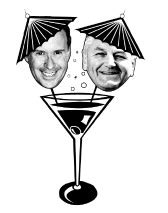BLOCK GOT blocked. The King County Labor Council endorsed challenger Lawrence Molloy over 27-year in cumbent Port Commissioner Jack Block. To grasp the significance of this tsunami, you must understand that Block is a working longshoreman, a veteran union member, and has generally been regarded as labor’s guy at the Port. In addition, Block’s loss is not the only harbinger of change at the Labor Council.
The seas grow even choppier after you spend a little time with Molloy. The challenger is not a knee-jerk labor booster. Admittedly, he is a strong supporter of unions in general and of using the Port’s maritime and aviation work to promote “livable wages.” But listen to what he says about labor on the piers: “Longshoremen have traditionally had sweetheart deals [on the waterfront]: Work one hour, get paid for eight hours.” While he opposes Port efforts to privatize work in crane maintenance (a hot topic at the Port), he notes that crane-maintenance workers “make six figures. There needs to be downward pressure on their wages.”
Earlier this year, supporters of City Council incumbent Jan Drago grumbled when boat-rocking challenger Curt Firestone received a co-endorsement from the Labor Council in their race. In her Seattle Weekly endorsement interview, incumbent Port Commissioner Paige Miller fumed that new Labor Council head Steve Williamson was creating “a new labor climate in this town, building movements through conflicts rather than through good contracts.”
Has a newly radicalized labor declared political war?
While Williamson seems genuinely bewildered by that notion, he does acknowledge that the political climate has changed down at the Labor Temple. The change reflects a national trend initiated by labor’s reformer-in-chief, the AFL-CIO’s John Sweeney. Traditionally, big labor’s leaders chose a candidate and put whatever rank-and-file muscle they could muster behind that individual. Often the union membership wasn’t excited about their leaders’ picks. Not only weren’t union members walking precincts, they weren’t even voting in very high percentages.
Sweeney changed labor’s whole political approach. Now labor starts with issues, rather than candidates, in its political work. The issues themselves come from surveys of the rank and file. The leadership grills candidates about where they stand on the issues and reports back to the members. Labor also gives out report cards on politicians that track incumbents’ voting records in office. Instead of getting union volunteers to volunteer for candidates, unions do their own outreach to other union members—an approach they call “labor to labor.” Unionists still walk precincts, but now they only visit other union members, talking about where candidates stand on issues critical to labor. They register union members to vote—in Washington state encouraging them to sign up as permanent absentee voters. This has boosted the union vote. The labor-to- labor strategy was initiated at the national level, so its impact was first felt in federal races for Congress and the president. The Washington State Labor Council adopted the approach for governor and the state Legislature three years ago, but 2001 is the first year that the change has filtered down to Washington’s local races, including those in King County.
WILLIAMSON SAYS, “It was the rank and file who drove the decision” to endorse Molloy over Block. “The Port has changed its way of dealing with labor,” he says. He cites some difficulties with the aforementioned crane-maintenance contract, as well as a thwarted union drive to organize skycaps. In response, the Labor Council’s members are going after Block. (Could this be because the two other incumbent Port commissioners, Miller and Pat Davis, do not have viable opponents?) Interest in the Port races ran so high this year that the Labor Council held the first ever candidates’ forum for its members. The result: “People liked Lawrence Molloy,” says Williamson.
King County’s new labor boss is clearly delighted with his members’ enthusiasm. It doesn’t hurt that the effort dovetails another of Williamson’s passions: building coalitions with environmentalists and the religious community. That coalition formed the backbone of the WTO demonstrations; it has fallen on tough times recently in other places, but Williamson sees the upcoming King County elections as another opportunity to cement those working relationships. He notes that the Washington Conservation Voters and the Labor Council have both identified three key races in the county this fall and are backing the same candidates: Molloy at the Port, Greg Nickels for mayor of Seattle, and Julia Patterson in the King County Council’s southern edge cities’ seat, the 13th District.
Williamson says that after he attended a vigil at Saint Mark’s Cathedral mourning the Sept 11th tragedy, he was struck by another theme of the Labor Council’s candidates. “It’s time to pull together. Molloy and Nickels are about that. It’s the future of politics in this region.”
Most pundits have predicted a boost for law-and-order tough guys like Mark Sidran after Sept 11th. We’ll see if Williamson and his new allies can prove conventional wisdom wrong.








